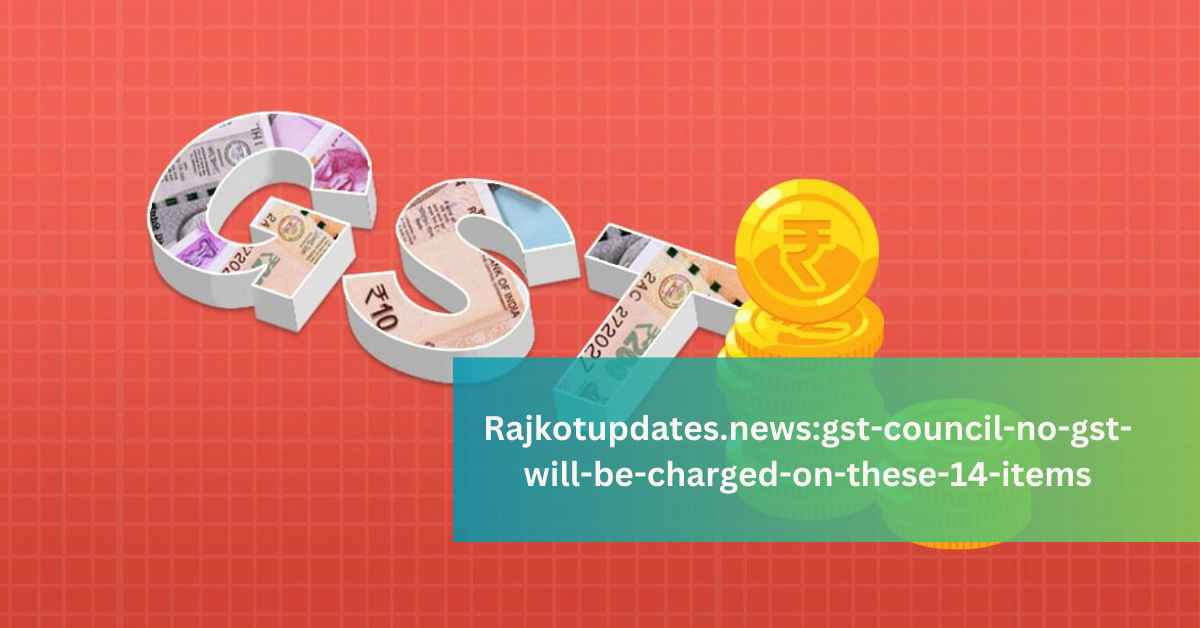
Rajkotupdates.news:gst-council-no-gst-will-be-charged-on-these-14-items
The Goods and Services Tax (GST) exemption on select food items when sold loose has recently garnered attention in India. This exemption, announced by Finance Minister Nirmala Sitharaman, aims to provide relief to both consumers and small businesses.
The move has the potential to impact the pricing, accessibility, and affordability of essential food items. In this blog post, we will delve into the details of this exemption, explore the rationale behind it, and discuss the implications it may have on various stakeholders, including consumers, local vendors, and the government.
By understanding the intricacies of this GST exemption, we can gain insights into its significance within the broader context of taxation and economic policies in India.
Reference to the news articles as Rajkotupdates.news:gst-council-no-gst-will-be-charged-on-these-14-items:
The news articles referenced for this overview include “Nirmala Sitharaman: No GST rates on select food items when sold loose” from The Indian Express, “No GST will be levied on these 14 items when sold loose: FM Sitharaman” from Livemint, and “Explained: No GST on 14 mass consumption items when sold loose” from The Times of India.
The exemption covers a list of 14 mass-consumption food items when sold loose. While the specific details may vary slightly based on the sources, the common food items mentioned include vegetables like potatoes, onions, and tomatoes, as well as fruits like bananas.
Additionally, cereals such as rice, wheat, and millet, along with pulses like lentils and grams, are included. Other items in the exemption list may encompass edible oils, salt, sugar, tea, coffee, spices, and flour. The intention is to provide relief on essential food items that are commonly consumed by the masses.
It is important to refer to the official government announcements or subsequent updates for the precise and comprehensive list of food items covered by the exemption.
Understanding the Rationale behind the Exemption:
The government’s decision to exempt select food items from GST when sold loose stems from several potential reasons. One objective could be to alleviate the tax burden on essential commodities, which are necessary for daily sustenance.
According to the report of Rajkotupdates.news:gst-council-no-gst-will-be-charged-on-these-14-items, By removing the GST on these items, the government aims to make them more affordable and accessible to the general public.
This exemption also aligns with the government’s efforts to simplify the GST structure, reduce compliance burdens, and promote ease of doing business.
Impact on small businesses and local vendors:
The exemption is expected to have a positive impact on small businesses and local vendors who predominantly engage in selling food items. These businesses often face challenges related to compliance costs and the formalization process.
By exempting GST on select food items when sold loose, the government intends to provide relief to these businesses and encourage their participation in the formal economy.
This move can potentially enhance the competitiveness of local vendors and boost their economic prospects.
Impact on consumer behavior and affordability:
The exemption on select food items when sold loose has implications for consumer behavior and affordability. Rajkotupdates.news:gst-council-no-gst-will-be-charged-on-these-14-items says, with the removal of GST the prices of essential food items may decrease, making them more affordable for consumers.
This could influence consumer preferences, potentially encouraging higher consumption of these food items. The reduced prices may also positively impact the affordability of basic necessities for households, especially those belonging to lower-income groups.
By enhancing affordability, the exemption aims to address food security concerns and contribute to the overall well-being of the population.
Implications and Benefits for Consumers: Rajkotupdates.news:gst-council-no-gst-will-be-charged-on-these-14-items
Analysis of the potential benefits for consumers:
The exemption of select food items from GST when sold loose brings several potential benefits for consumers. Firstly, it can lead to reduced prices for essential food items, making them more affordable for individuals and households.
This can contribute to improving the overall standard of living, particularly for lower-income groups. Secondly, the exemption can enhance the accessibility of these food items, as local vendors and small businesses may find it easier to offer them without the burden of GST.
This can lead to wider availability of these items in local markets, ensuring better access for consumers.
How the exemption affects pricing and affordability?
The exemption of GST on select food items when sold loose can impact pricing and affordability in multiple ways. Firstly, the removal of GST eliminates the tax component from the cost of these food items.
As a result, the prices of these items can potentially decrease, providing consumers with cost savings. Additionally, the exemption can indirectly impact affordability by reducing the overall tax burden on individuals and households, particularly on essential food items that form a significant portion of their expenditure.
The combined effect of lower prices and reduced tax burden can contribute to improved affordability and financial well-being for consumers.
Impact on the availability and accessibility of select food items:
The exemption has the potential to positively influence the availability and accessibility of select food items. Local vendors and small businesses, who often play a crucial role in the distribution of essential food items, may find it more feasible to offer these items when exempted from GST.
This can lead to an increased presence of local vendors selling these items, thereby improving their availability in local markets, including in underserved areas. The exemption can also facilitate the expansion of informal markets, as smaller vendors may find it easier to compete with larger retailers.
This, in turn, can enhance the accessibility of select food items for consumers, particularly those who rely on local markets for their daily needs.
Impact on Local Vendors and Small Businesses
Relief provided to local vendors and small businesses:
The exemption of GST on select food items when sold loose provides significant relief to local vendors and small businesses.
According to Rajkotupdates.news:gst-council-no-gst-will-be-charged-on-these-14-items, These businesses often operate on narrow profit margins and face challenges in complying with the formal tax structure.
By exempting GST on the sale of these items, the government reduces the compliance burden for small businesses, allowing them to focus on their operations and growth. This relief can contribute to the sustainability and survival of local vendors and small businesses, helping them thrive in the competitive market.
Analysis of the potential increase in competitiveness for informal markets:
The GST exemption has the potential to increase competitiveness for informal markets, primarily represented by local vendors and small businesses.
The removal of GST on select food items sold loose allows these businesses to offer products at comparatively lower prices than formal retail establishments, which are subject to GST.
This competitive advantage can attract consumers who seek affordability and personalized services. Consequently, informal markets may experience growth and expansion, leading to increased entrepreneurship and economic opportunities within local communities.
Potential challenges and implementation issues:
While the GST exemption offers relief to local vendors and small businesses, there may be certain challenges and implementation issues to address. It is crucial to ensure that the exemption reaches the intended beneficiaries effectively and efficiently.
This requires clear guidelines and robust mechanisms for identification, verification, and monitoring. Additionally, there may be a need for capacity building and awareness programs to educate vendors about the benefits and compliance requirements associated with the exemption.
Addressing these challenges can help maximize the positive impact of the exemption and ensure its successful implementation.
Effect on Government Revenue and GST Implementation: Rajkotupdates.news:gst-council-no-gst-will-be-charged-on-these-14-items
Impact on government revenue collection:
The exemption of select food items from GST when sold loose may have an impact on government revenue collection. As these items are now exempted, the tax revenue generated from their sale will decrease.
However, it is important to note that the exemption is targeted at essential food items consumed by the masses, and the intention is to provide relief to consumers and small businesses.
The overall impact on government revenue will depend on the volume of sales, the extent of the exemption, and the potential increase in consumption due to lower prices.
How does the exemption align with the broader GST implementation strategy?
The exemption of select food items from GST when sold loose aligns with the broader GST implementation strategy in India.
With the help of Rajkotupdates.news:gst-council-no-gst-will-be-charged-on-these-14-items, The GST was introduced to streamline and unify the tax system, reduce cascading effects, and create a common market.
By exempting essential food items, the government aims to make them more affordable and accessible to the masses. This move reflects the intent to alleviate the tax burden on basic necessities and promote inclusivity.
It also aligns with the government’s goal of simplifying the GST structure and rationalizing tax rates to create a more efficient and taxpayer-friendly system.
Analysis of potential adjustments to maintain tax compliance and revenue targets:
To maintain tax compliance and revenue targets, the government may need to consider potential adjustments.
This could include measures such as expanding the tax base by including other goods or services, ensuring strict compliance and monitoring mechanisms to prevent misuse of the exemption, and implementing effective audit and assessment processes.
Additionally, the government may explore alternative revenue sources or explore ways to optimize revenue collection from non-exempted goods and services.
Regular reviews and evaluations of the impact of the exemption and its implications on government revenue will be crucial in formulating appropriate strategies to maintain fiscal sustainability.
Conclusion of Rajkotupdates.news:gst-council-no-gst-will-be-charged-on-these-14-items
The GST exemption on select food items when sold loose has significant implications for various stakeholders. Consumers stand to benefit from lower prices and improved affordability, while local vendors and small businesses can experience relief and increased competitiveness.
The exemption aligns with the broader GST implementation strategy, focusing on simplification, rationalization, and inclusivity. However, it also poses challenges in terms of revenue collection for the government, necessitating potential adjustments to ensure compliance and meet revenue targets.
Overall, the GST exemption represents a step toward making essential food items more accessible and affordable, while maintaining a delicate balance between economic considerations and fiscal sustainability.
You May Also Like

Crypto30 x.com – Simplify Crypto Investing Now!
January 21, 2025
Understanding the Benefits of Hiring a Concealed Carry Attorney
January 25, 2024